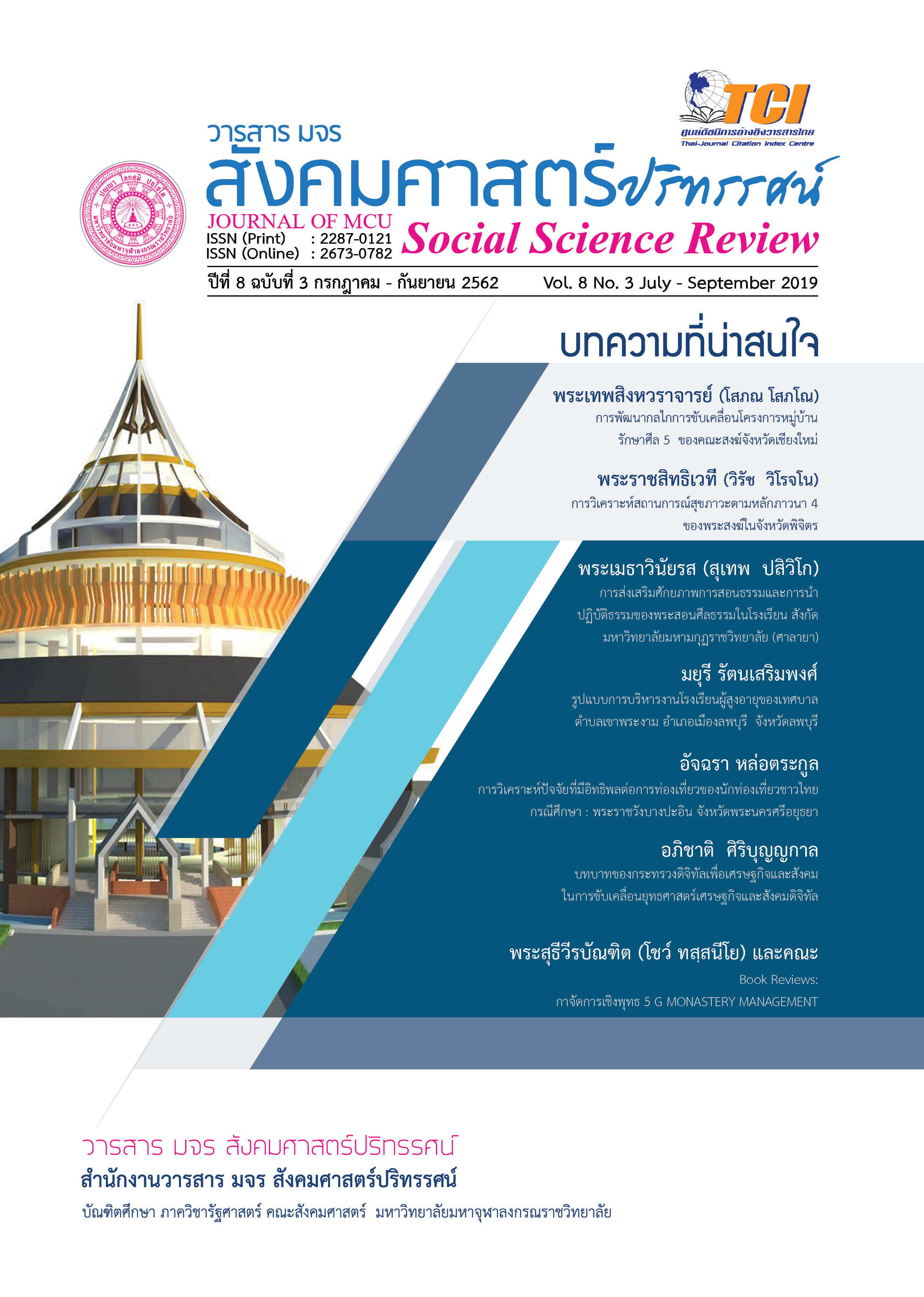ศักยภาพการจัดการการปรับเปลี่ยนเชิงกลยุทธ์และความยั่งยืนขององค์กร: การตรวจสอบเชิงประจักษ์ธุรกิจอิเล็กทรอนิกส์และเครื่องใช้ไฟฟ้าในประเทศไทย
คำสำคัญ:
การจัดการการปรับเปลี่ยน, ศักยภาพการจัดการการปรับเปลี่ยนเชิงกลยุทธ์; ธุรกิจอิเล็กทรอนิกส์และเครื่องใช้ไฟฟ้าบทคัดย่อ
สภาพแวดล้อมทางธุรกิจและเศรษฐกิจถือว่ามีการแข่งขันที่สูง ดังนั้นบริษัทต้องมีการสร้างวิถีทางในการขับเคลื่อนธุรกิจของตนผ่านการจัดการการเปลี่ยนแปลง งานวิจัยนี้มีวัตถุประสงค์เพื่อสำรวจอิทธิพลของสมรรถนะการวางแผนการดำเนินงานเชิงรุก การมุ่งเน้นโครงสร้างองค์กรแบบยืดหยุ่น ศักยภาพนวัตกรรมการจัดการสมัยใหม่ การประยุกต์ใช้กลยุทธ์ธุรกิจเชิงพลวัต และการมุ่งเน้นการประยุกต์ใช้เทคโนโลยีในการบริหารจัดการที่มีต่อการปรับปรุงการปฏิบัติงานที่มีคุณค่า งานวิจัยนี้ใช้การเก็บรวบรวมข้อมูลโดยใช้แบบสอบถามและตอบกลับมาทั้งสิ้นจำนวน 167 คนของธุรกิจอิเล็กทรอนิกส์และเครื่องใช้ไฟฟ้าในประเทศไทยและอัตราตอบกลับคืน 26.17% ผลการวิเคราะห์การถดถอยแสดงให้เห็นว่าการมุ่งเน้นการประยุกต์ใช้เทคโนโลยีในการบริหารจัดการมีผลกระทบอย่างมีนัยสำคัญต่อการปรับปรุงการปฏิบัติงานที่มีคุณค่าและการพัฒนากระบวนการใหม่ นอกจากนี้การประยุกต์ใช้กลยุทธ์ธุรกิจเชิงพลวัตมีผลกระทบอย่างมากต่อการพัฒนากระบวนการใหม่ งานวิจัยนี้อาจเป็นประโยชน์สำหรับนักวิชาการ กรรมการผู้จัดการและคู่ค้าและผู้ที่ต้องการจะประสบความสำเร็จในการกำหนดนโยบายของบริษัท
เอกสารอ้างอิง
Armstrong, J.S. & Overton, T. (1977). estimating Non-response Bias in Mail Surveys. journal of marketing research, 14 (3), 396-402.
Bezdrob, M. & Sunje, A. (2014). management innovation – designing and testing a theoretical model. south east european journal of economics and business, 9 (1), 16-29.
Bozkurta, O., Kalkanb, A. & Arman, M. (2014). the relationship between structural characteristics of organization and followed business strategy: an application in denizli. procedia - social and behavioral sciences, 150 (1), 222-229.
Chai-Amonphaisal, K. & Ussahawanitchakit, P. (2010). strategic management accounting and corporate performance of thai-listed companies: a mediating effect of management process. international journal of strategic management, 10 (1), 1-23.
Dyllick, T. & Hockerts, K. (2002). beyond the business case for corporate sustainability. business strategy and the environment, 11 (2), 130-141.
Garrido-Vega, P., Ortega Jimenez, C., de los Ríos, J. & Morita, M. (2015). implementation of technology and production strategy practices: relationship levels in different industries. international journal of production economics, 161 (1), 201-216.
Gupta, S. & Kumar, V. (2013). sustainability as corporate culture of a brand for superior performance. journal of world business, 48 (3), 311–320.
Hair, J.F., Black, W.C., Babin, B.J. & Anderson, R.E. (2010). multivariate data analysis: a global perspective. 7th ed. new jersey: pearson prentice hall.
Ionescu, v., Cornescu, V. & Druica, E. (2012). flexible organization. global business and management research. an international journal, 4 (3&4), 277-285.
Jaca, C., Viles, E., Mateo, R. & Santos, J. (2012). components of sustainable improvement systems: theory and practice. the tqm journal, 24 (2), 142-154.
Nadkarni, S. & Narayanan, V. K. (2007). strategic schemas, strategic flexibility, and firm performance: the moderating role of industry clock speed. strategic management journal, 28 (3), 243-270.
Nunnally, J. C. & Bernstein, I. H. (1994). psychometric theory. new york: mcGraw hill inc.
Ojha, S. (2015). operational excellence for sustainability of Nepalese industries. procedia - social and behavioral sciences, 189, 458-464.
Reichstein, T. & Salter, A. (2006). investigation the sources of process innovation among uk manufacturing firms. industrial and corporate change, 15 (4),
653–682.
Relich, M. & Pawlewski, P. (2017). a case-based reasoning approach to cost estimation of new product development. neurocomputing, 000, 1-6.
Shobaki, M., Amuna, Y. & Naser, S. (2016). strategic and operational planning as approach for crises management field study on unrwa. international journal of information technology and electrical engineering, 5 (6), 43-47.
Stock, G. & Tatikonda, M. (2004). external technology integration in product and process development. international journal of operations and production management, 24 (7), 642-665.
Teece, D. (1996). firm organization, industrial structure, and technological innovation. journal of economic behavior & organization, 31, 193-224.
Thome, A., Scavarda, L., Fernandez, n. & Scavarda, A. (2012). sales and operations planning and the firm performance. international journal of productivity and performance management, 61 (4), 359-381.
Uddin, Md., Fan., L. & Das. (2017). a study of the impact of transformational leadership, organizational learning, and knowledge management on organizational innovation. management dynamics, 16, 42-54.
Volberda, H., Van Den Bosch, F. & Heij, C. (2013). management innovation: management as fertile ground for innovation. european management review, 10 (1), 1-15.
Weerawardena, J., O'Cass, A. & Craig. J. (2006). does industry matter? examining the role of industry structure and organizational learning in innovation and brand performance. journal of business research, 59 (1), 37–45.
Yu, Dennis Z., Tang, Sammi Y. & Niederhoff. (2011). on the benefits of operational flexibility in a distribution network with transshipment omega. the international journal of management science, 39 (3), 350-361.
Zare, M., Azzar, S., Mardani, A. & Arein, M. (2015). from change to organizational transformation a survey of tehran medical science university’s libraries. library management, 36 (1/2), 157-167.
ดาวน์โหลด
เผยแพร่แล้ว
รูปแบบการอ้างอิง
ฉบับ
ประเภทบทความ
สัญญาอนุญาต
ลิขสิทธิ์ (c) 2019 วารสาร มจร สังคมศาสตร์ปริทรรศน์

อนุญาตภายใต้เงื่อนไข Creative Commons Attribution-NonCommercial-NoDerivatives 4.0 International License.
เพื่อให้เป็นไปตามกฎหมายลิขสิทธิ์ ผู้นิพนธ์ทุกท่านต้องลงลายมือชื่อในแบบฟอร์มใบมอบลิขสิทธิ์บทความให้แก่วารสารฯ พร้อมกับบทความต้นฉบับที่ได้แก้ไขครั้งสุดท้าย นอกจากนี้ ผู้นิพนธ์ทุกท่านต้องยืนยันว่าบทความต้นฉบับที่ส่งมาตีพิมพ์นั้น ได้ส่งมาตีพิมพ์เฉพาะในวารสาร มจร สังคมศาสตร์ปริทรรศน์ เพียงแห่งเดียวเท่านั้น หากมีการใช้ภาพหรือตารางหรือเนื้อหาอื่นๆ ของผู้นิพนธ์อื่นที่ปรากฏในสิ่งตีพิมพ์อื่นมาแล้ว ผู้นิพนธ์ต้องขออนุญาตเจ้าของลิขสิทธิ์ก่อน พร้อมทั้งแสดงหนังสือที่ได้รับการยินยอมต่อบรรณาธิการ ก่อนที่บทความจะได้รับการตีพิมพ์ หากไม่เป็นไปตามข้อกำหนดเบื้องต้น ทางวารสารจะถอดบทความของท่านออกโดยไม่มีข้อยกเว้นใดๆ ทั้งสิ้น





